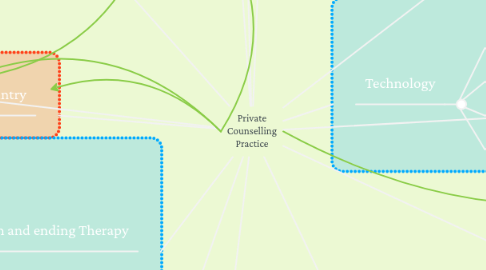Private Counselling Practice
by Josi Mannella

1. Laws of the state/country
2. Self-care
2.1. Tune out and turn off
2.2. De-brief with supervisor.
2.3. Walk, breathe and enjoy the time you set for yourself. If you can't recharge yourself, how can you help others.
3. Termination and ending Therapy
3.1. Ensure you keep the client informed about the end of therapy.
3.2. Prepare psychoeducation and referrals
3.3. Let them know they are welcomed back.
3.4. Feedback is a wonderful thing
4. Regulatory Bodies
5. Society
6. POWER Imbalance
6.1. be authentic
6.2. Let them led and help guide.
6.3. Empower the client and be mindful of your words.
6.3.1. Words can hurt
7. Family (Because working from home)
7.1. Ensure it is in a safe place away from others ears.
7.2. Don't bring your work out into the family.
7.3. Be present with them, when with them.
7.4. If a client is ever in person, ensure the boundary is set to prevent a complicated relationship.
8. Dual Relationships
8.1. small town, family, friends
8.2. Be mindful of transference and counter transference.
9. Technology
9.1. capability for both counsellor and client
9.2. 3rd party app T&C
9.3. Secure and safe
9.4. No adding to social media
10. Confidentiality and it's limitations
10.1. Mandatory Reporting
10.2. Supervisor briefing
10.3. Harm to self or others
11. Boundaries
11.1. Setting work hours
11.2. Providing client with after hours care hotlines like Lifeline.
11.3. No socialisation outside of sessions if client invites you.
11.4. Ensuring it remains professional at all times being mindful of transference.
12. Expertise and education
12.1. remain up to date on laws, ethics, education.
12.2. Work within your capabilities. i.e: I am a novice counsellor that has no experience with BPD and I would refer clients to the appropriate therapists. Working above your expertise can harm a client because they see you as the expert.
13. Self-awareness and Understanding limitations
13.1. what can hinder a positive outcome?
13.2. Are you being congruent with self?
14. Client


